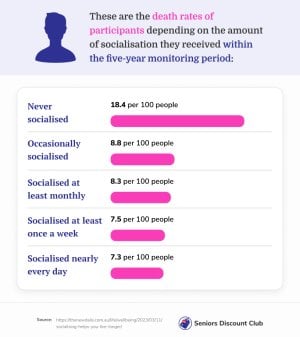Want to live longer? Connecting with your community may be the key
- Replies 8
The past few years have been a tumultuous ride for all of us. With the pandemic confining us to our homes and restricting our social interactions, many of our loved ones, especially older adults, are feeling the sting of loneliness and social isolation.
But did you know that this feeling of isolation is not just a matter of the heart, but a matter of life and death?
According to the US National Institute on Health, loneliness and social isolation can be more harmful to our health than smoking 15 cigarettes a day or being obese. Shockingly, social isolation can even take as much as 15 years off a person's life!
This is because the lack of social interaction can wreak havoc on our physical and mental health, with the US Centre for Disease Control warning that social isolation can increase the risk of dementia by 50%, heart disease by 29%, and stroke by 32%.

We know that the statistics on social isolation and loneliness can be tough to swallow, but we've got some good news to share! A recent study conducted by researchers from Sichuan University West China Hospital has found some encouraging results.
The study examined the social habits of over 28,000 seniors and their overall mortality rate. And the results?
Older adults who regularly connect with their friends, family, and community are more likely to live longer! In fact, the study found that seniors who socialised almost every day had a significantly better chance of living longer than those who rarely or never socialised.
The study, which draws from the Chinese Longitudinal Healthy Longevity Survey (CLHLS), is an ongoing nationally representative study of older people living independently. It began in 1998 and information on socialising behaviour has been collected since 2002. The new study focuses on five separate waves of data collection up to 2019.
Participants, whose average age was 89, were asked to rank their social activity as almost every day; at least once a week; at least once a month; occasionally; or never. General information collected included sex, education, marital status, household income, fruit and vegetable intake, lifestyle, and poor health.
Over the first five years of the study, 25,406 people reported not engaging in any social activities. During the entire monitoring period, 21,161 (74 per cent) participants died, and 15,728 of them died within the first five years.
And within that five-year monitoring period, older adults who never socialised had a death rate of 18.4 per 100 people monitored for a year. On the other hand, those who socialised almost every day had a death rate of only 7.3 per 100 people monitored for a year.
That means people who never socialised were more than twice as likely to die earlier than those who socialised daily!

The results of this study highlight the importance of maintaining an active social life, particularly for older adults.
It's easy to get caught up in our day-to-day routines and forget to make time for socialising, but this research shows that doing so can have a profound impact on our health and longevity.
So, if you're looking for ways to increase your social engagement, there are plenty of options available.
Consider joining a community group or club, volunteering your time to a cause you care about, or simply reaching out to friends and family for regular catch-ups. Even attending meet-ups with fellow members of the Seniors Discount Club can be a great way to stay connected and engaged!
What other tips do you have for staying socially active? Share them in the comments below!
But did you know that this feeling of isolation is not just a matter of the heart, but a matter of life and death?
According to the US National Institute on Health, loneliness and social isolation can be more harmful to our health than smoking 15 cigarettes a day or being obese. Shockingly, social isolation can even take as much as 15 years off a person's life!
This is because the lack of social interaction can wreak havoc on our physical and mental health, with the US Centre for Disease Control warning that social isolation can increase the risk of dementia by 50%, heart disease by 29%, and stroke by 32%.

The more often older adults socialised, the greater likelihood of living significantly longer. Credit: Phillip Leone.
We know that the statistics on social isolation and loneliness can be tough to swallow, but we've got some good news to share! A recent study conducted by researchers from Sichuan University West China Hospital has found some encouraging results.
The study examined the social habits of over 28,000 seniors and their overall mortality rate. And the results?
Older adults who regularly connect with their friends, family, and community are more likely to live longer! In fact, the study found that seniors who socialised almost every day had a significantly better chance of living longer than those who rarely or never socialised.
The study, which draws from the Chinese Longitudinal Healthy Longevity Survey (CLHLS), is an ongoing nationally representative study of older people living independently. It began in 1998 and information on socialising behaviour has been collected since 2002. The new study focuses on five separate waves of data collection up to 2019.
Participants, whose average age was 89, were asked to rank their social activity as almost every day; at least once a week; at least once a month; occasionally; or never. General information collected included sex, education, marital status, household income, fruit and vegetable intake, lifestyle, and poor health.
Over the first five years of the study, 25,406 people reported not engaging in any social activities. During the entire monitoring period, 21,161 (74 per cent) participants died, and 15,728 of them died within the first five years.
And within that five-year monitoring period, older adults who never socialised had a death rate of 18.4 per 100 people monitored for a year. On the other hand, those who socialised almost every day had a death rate of only 7.3 per 100 people monitored for a year.
That means people who never socialised were more than twice as likely to die earlier than those who socialised daily!
Key Takeaways
- Researchers have sought to identify how badly loneliness and social isolation put your health at risk.
- A new study from Sichuan University West China Hospital found the more often seniors socialised, the greater their likelihood of living significantly longer.
- People who never socialised were more than twice as likely to die earlier than those who socialised every day.
The results of this study highlight the importance of maintaining an active social life, particularly for older adults.
It's easy to get caught up in our day-to-day routines and forget to make time for socialising, but this research shows that doing so can have a profound impact on our health and longevity.
So, if you're looking for ways to increase your social engagement, there are plenty of options available.
Consider joining a community group or club, volunteering your time to a cause you care about, or simply reaching out to friends and family for regular catch-ups. Even attending meet-ups with fellow members of the Seniors Discount Club can be a great way to stay connected and engaged!
What other tips do you have for staying socially active? Share them in the comments below!








